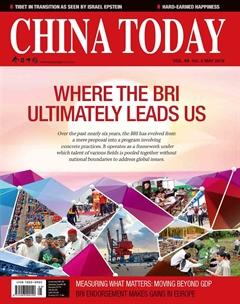A Small Town Romance
By staff reporter ZHOU LIN
ASIA Weekly once nominated the “Top 100 Chinese Novels in the 20th Century.” A collection of short stories Call to Arms by Lu Xun ranked No.1, with Shen Congwens Border Town on its heels.
Shen Congwen (1902-1988) is considered to be one of the most influential writers in Chinas modern history. Throughout his lifetime, Shen wrote a great number of novels and proses, among which Border Town occupies a unique place.
The story happened in the 1930s in a little town called Chadong at the junction of Sichuan and Hunan provinces. In lyrical and essay-style writing, the author brings to life the romantic story of a young country girl Cuicui in the background of the local custom of ethnic minority groups. The beautifully written novel is a moving testament to the human spirit, and thus has attracted the attention and praise of numerous overseas readers who appreciate its aesthetic charms.
The novel has been translated into over 40 languages including Japanese and English, and has been added into the recommended reading lists of universities in a dozen of countries such as the United States, Japan, Korea, and the United Kingdom.
Various renditions of the novel can be found now but the most well-known is translated by Jeffrey C. Kinkley, a sinologist and a professor of history at St. Johns University in New York. Kinkley is reputed as the first foreign scholar who started academic studies on Shen Congwen. He is also the author of The Odyssey of Shen Congwen and the editor of Imperfect Paradise, a collection of Shens stories. Critics said that Kinkleys narration of the novel under the global context had successfully brought Shens Border Town to the center of the literary worlds spotlight.
The story starts like this:
“An old imperial highway running east from Sichuan into Hunan Province leads, after reaching the west Hunan border, to a little mountain town called Chadong. By a narrow stream on the way to town was a little white pagoda, below which once live a solitary family: an old man, a girl, and a yellow dog.”
Reading the gracefully written novel is like reading a lyrical poem or an essay, or watching a Chinese ink-wash painting which skillfully depicts the customs of western Hunan. Shen himself was born in Phoenix County in Hunan. His father is of the Han ethnicity, while his mother and grandmother are from Miao and Tujia ethnic groups respectively. The multicultural background had far-reaching impact on him and his works.
Two aspects are usually highlighted when discussing about the literary achievements of Border Town.
First is the exquisite psychological description of characters, whether to show their beautiful inner worlds, or reveal the darkness of souls. Many techniques of expressions are used to portray their personalities, including dialogues, monologues, actions, posture, and facial expressions. Meanwhile, the protagonists fantasy and dreamland are vividly described, together with the description of surrounding scenery and people.
In this novel, Cuicui is often lost in her own fantasies and conjectures, reflecting the agitation in the girls heart of longing for romance and the sweet feeling of falling in love. The author leads readers to understand Cuicuis mind from her language and manner. For example, Cuicui pouts prettily with a bit of complaining tone, begging her grandpa to abandon the ferryboat and return to her side. Readers can feel Cuicui has formed a strong attachment to her grandpa. While the ferryman sings the songs that she heard in her dreams, Cuicui murmurs, “I picked another bunch of saxifrage(a metaphor for love in the novel).”Readers can again feel the girls crush on her beau.
Second is the poetic and picturesque description of the setting. The psychological musings of characters are immersed in the atmosphere of poetic painting. The beautiful sceneries of western Hunan, including the crowing of yellow warblers, the sounds of insects, the enchanting sunset, and the silver moonlight, all reflect the emotional world of the character. The soft and tranquil dusk time set off by the contrast of Cuicuis inner agitation and desolation; while the milky moonlight and the hazy mist floating on the surface of the lake, as well as the insectsensemble music indulge readers in the imagery of Cuicuis longing for her lovers passionate songs.
Wang Zengqi, a renowned Chinese author, writer, and playwright, once declared Shens Border Town as the best of his writing; not that arbitrary or unrestrained, nor overpolished or obscure to understand. Instead, his words are like a basket of fresh cherries, juicy and wellstacked, with the alluring color of agate.
- CHINA TODAY的其它文章
- The Complex Beauty of Chinese Filigree Inlay Art
- New Destinations of an Old Highway
- Why the Belt and Road Initiative Is Anything but a Debt Trap
- The Stilted Buildings of the Tujia People
- Jiuzhai Valley:A Vibrant Display of Color and Water
- Hanshi Festival,Born of a Heartbreaking Tale of Loyalty

